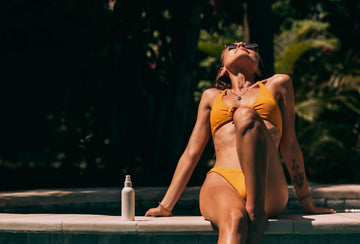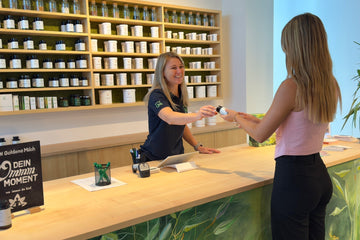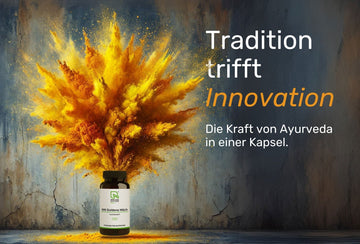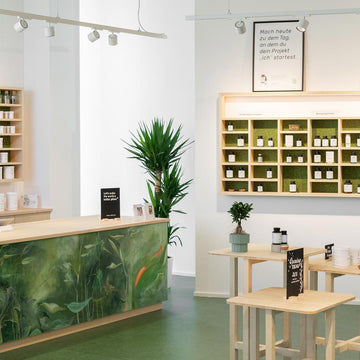Summertime is sun time—and unfortunately, for many, it's also the time for sunburn, itchy skin, and the classic "I was only lying in the sun for a short time!" Skin doesn't forget—and UV radiation has long-term effects on its health and appearance. But many only think of sun protection as creams and lotions. But your skin's protection doesn't start on the surface, but deep within your cells.
In this article, you'll learn what really happens to your skin when you get sunburned, why sunscreen is important but not everything – and how you can support your skin from within with targeted nutrients to optimally protect yourself against the sun.
What happens when you get sunburned – and why is UV radiation so dangerous?
The sun's ultraviolet radiation consists of UVA, UVB, and UVC rays . The latter rarely reach the Earth's surface. The most relevant—and problematic—rays for us are:
- UVB rays, which penetrate the upper layers of the skin and cause acute damage there, are the main trigger for sunburn.
- UVA rays penetrate deeper into the tissue, accelerating skin aging, weakening connective tissue, and generating free radicals.
Sunburn is ultimately an inflammatory reaction of your skin cells . DNA is damaged by radiation, free radicals are created, and your immune system reacts with repair and defense processes. You feel this as redness, heat, tightness, or even blisters.
More importantly, even if you don't get a visible sunburn, UV radiation can cause invisible cellular stress , which in the long run contributes to skin aging and, in the worst case, skin cancer. That's why thoughtful protection is so crucial—and should be implemented on multiple levels.
Why sunscreen alone is not enough:
Sunscreen is an important protective measure—but it has its limitations. Many people lull themselves into a false sense of security with a high SPF, but forget how sensitive and reactive our skin really is.
Firstly, there are application errors:
- The recommended amount is often not achieved (e.g. one teaspoon per arm).
- Reapplying cream is forgotten – even though water, sweat or clothing quickly reduce the protective layer.
- Some areas of skin are regularly left out: ears, neck, back of the feet or scalp.
Second, sunscreen only provides external protection . It blocks UV radiation, but the radicals that do penetrate the skin cells—where the actual damage occurs. Sunscreen cannot prevent these oxidative processes.
For holistic protection, it's not enough to just apply cream. Your skin also needs support from within – through nutrients that strengthen cells and make them more resistant to UV-induced stress.
What does sun protection factor (SPF) actually mean?
The sun protection factor – abbreviated SPF – indicates how much longer you can stay in the sun with sunscreen without getting sunburned.
Example:
- Your self-protection is 10 minutes.
- With SPF 30 you can theoretically stay in the sun for 30 × 10 minutes = 300 minutes.
- SPF 50 extends this time to 500 minutes.
Important: This value is purely mathematical. In practice, many factors influence the actual duration of protection:
- How much cream you apply
- Whether you sweat, bathe or wear clothes
- How regularly you apply cream
- And of course your skin type and UV intensity
Also crucial: SPF only refers to UVB rays. Adequate protection against UVA rays—which penetrate deeper into the skin—is only provided if the cream is labeled "UVA protection" or "broad spectrum."
Bottom line: Sunscreen is essential, but it doesn't provide complete protection. And it has its limitations. That's why it makes even more sense to also rely on sun protection from within – for your cells, your skin, and your well-being.
Sun protection from the inside – what’s behind it?
UV radiation leads to the formation of free radicals in the skin. These unstable molecules attack cell structures, promote inflammatory reactions, disrupt natural regeneration, and weaken the skin barrier.
The body does have its own protective systems—primarily antioxidants that neutralize free radicals. However, in strong sunlight, this balance quickly becomes disrupted. The result: oxidative cell damage .
This is where sun protection from within comes into play: By specifically supplying antioxidant micronutrients, you can strengthen your skin from within – and help your cells cope better with UV stress.
Active ingredients such as astaxanthin, beta-carotene, vitamins C and E, glutathione, and OPC have proven helpful in nutritional concepts. They can help:
- to mitigate oxidative processes,
- to regulate inflammatory reactions,
- to support cell regeneration
- and make the skin more resistant to UV radiation.
Combined with external protection, this results in a holistic approach that has both a preventative and regenerative effect.
Three NN products for your natural cell protection
Our three summer favorites from Nikolaus Nature were developed precisely for this challenge: They help you supply your cells with targeted antioxidant micronutrients – for comprehensive, internal sun protection.
NN Astaxanthin – Cell protection with plant power
Astaxanthin is an exceptionally powerful antioxidant from the blood-rain algae Haematococcus pluvialis. This algae produces astaxanthin to protect itself under extreme environmental conditions—and this is precisely the protective mechanism your body uses.
What NN Astaxanthin can do for you:
- It penetrates cell membranes and acts in both fat- and water-soluble areas.
- It can help buffer UV-induced oxidative stress.
- It supports not only the skin, but also the eyes, muscles and immune system.
Many of our customers especially appreciate NN Astaxanthin in the summer—for example, before a vacation, when spending a lot of time outdoors, or during strenuous exercise. As a daily supplement, it fits perfectly into any routine and delivers a continuous, stable effect—without any additives.
NN Provitamin A – Herbal skin care from within
In this product, we combine high-quality beta-carotene – the plant-based precursor to vitamin A – with selected accompanying substances. The advantage of beta-carotene: Your body converts it into active vitamin A only when needed, thus eliminating the risk of oversupply.
This is what NN Provitamin A contains:
- Beta-carotene (18 mg per serving): Supports skin, vision, mucous membranes
- Lutein & Zeaxanthin: For eye health and antioxidant cell protection
- Polypodium leucotomos: A traditionally used plant extract studied in relation to UV stress
Provitamin A is a useful summer supplement, especially for people with sensitive or light skin – and it doesn't contain any synthetic vitamin A.
NN Antioxidant – Your daily cell protection
Our most holistic product for everyday cell protection – especially during times of high exposure to UV rays, environmental factors, or stress.
What's inside?
- Vitamins C & E: Protect cells from free radicals
- OPC from grape seeds, glutathione, alpha-lipoic acid, coenzyme Q10: Important components for cell metabolism and antioxidant balance
- Green tea polyphenols, lutein, lycopene, beta-carotene: pure plant power
NN Antioxidant is ideal for anyone who wants to support their skin and cells every day—whether on summer vacation, during outdoor sports, or simply in the hectic pace of everyday life. It's versatile, effective, and completely natural—just as you'd expect from Nikolaus Nature.
Holistic protection begins with you
Whether you're planning your summer trip, working outdoors a lot, or simply want to take good care of yourself, sun protection is more than just applying sunscreen. Your skin is a complex organ exposed to daily stress—and it deserves protection on all levels. With a combination of external sunscreen and internal cell protection, you'll be well prepared. Products like NN Astaxanthin, NN Provitamin A, and NN Antioxidant help you provide targeted support for your skin—so you can enjoy the sun without risking your health.














